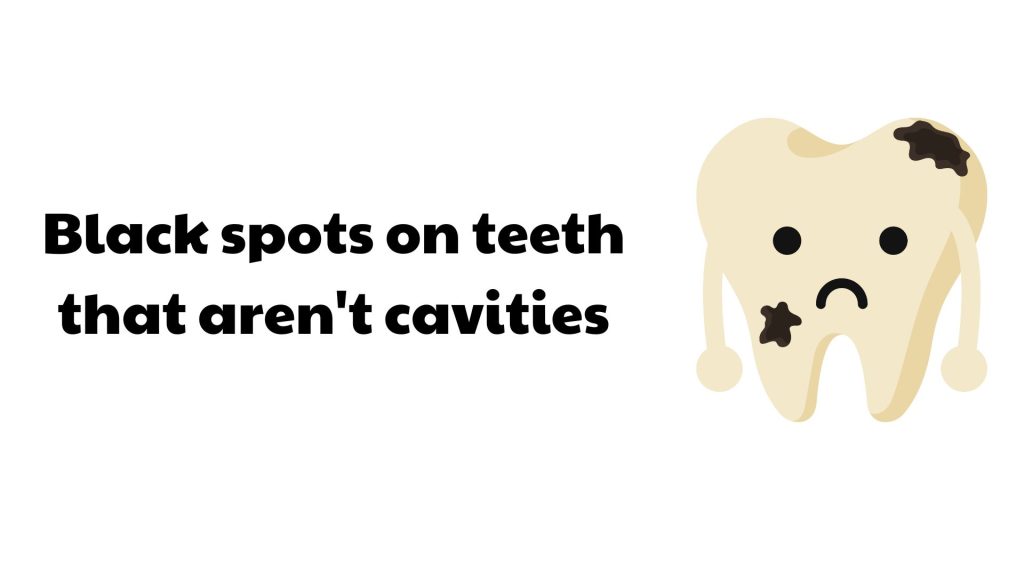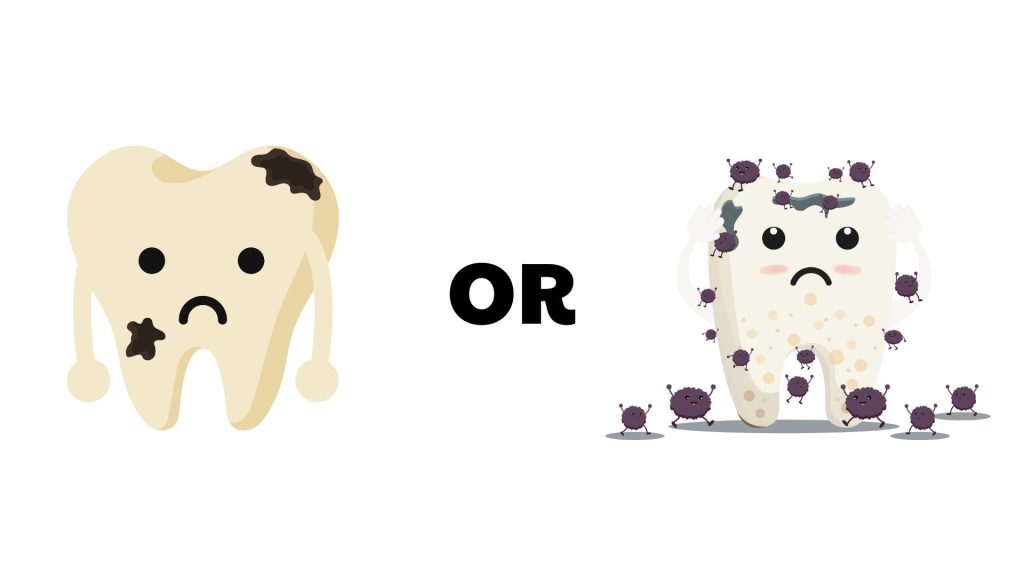Black spots on teeth that aren’t cavities – it’s a common concern that many people may encounter when examining their oral health. Fortunately, these puzzling black patches don’t usually mean dental decay. For a healthy, confident smile, it’s important to know what causes these black spots that aren’t caused by cavities and what might help. This article will discuss the causes of these spots, their risks, and ways to manage and avoid them. Read on to learn about non-caries black patches on teeth.
Cases Of Black Spots On Teeth That Aren’t Cavities

One of the most common worries about oral health is dark spots on teeth that aren’t caused by cavities. If you see weird black spots on your teeth, you may be worried and want to know what they indicate. We’ll examine the indicators of non-cavity dark places in this section. Understanding these indications can help you confidently evaluate your oral health and provide necessary treatment:
- Unusual color: Non-cavity stains are usually a different hue than the teeth. They might look like black spots, black patches, or black stains on the teeth.
- No painful symptoms: If there is no discomfort, then the black spots probably aren’t caries. Dark patches on your teeth may not be cavities if you don’t feel pain or irritation.
- No change in tooth shape: Non-cavity stains seldom modify tooth form—only the surface color changes.
- No cavity feeling: Touching non-caries black spots with fingertips or soft objects does not leave holes or blanks on the tooth surface. They differ from decayed teeth, which feel hollow.
- Dental Care’s Importance: Black spots that don’t heal may indicate a mouth issue other than a cavity. Thus, if you see inexplicable black spots on your teeth, consult your dentist for a proper diagnosis and explanation.
However, accurately identifying dark patches that are not cavities is crucial for dental care choices.
What Non-Caries Black Tooth Stains Are Dangerous?
There are several instances when black patches on non-cavity teeth should be checked by a dentist. Some examples:
- Gum disease: Non-cavity black patches on teeth may be caused by gum diseases such as gingivitis or severe gingivitis. Untreated gum disorders may lead to deep gum disease, gum disease, and tooth loss.
- Chipped or broken teeth: If your teeth are chipped or fractured, plaque may build up in the crevices and cause a black stain. This might cause infection and oral dysfunction if neglected.
- Irregular tooth structure: Some dark spots on teeth that are not cavities can be caused by uneven or crooked tooth structure. This can happen when teeth are too far apart, have small cracks, or have enamel that isn’t spread out evenly. Structural issues may make oral hygiene difficult and raise the risk of tooth decay and gum disease if left untreated.
- Endocrine diseases: Endocrine illnesses including hypothyroidism or hypercortisolism may discolor teeth, including black stains that are not cavities. These need medical attention.
What’s The Difference Between Black Patches And Caries?

Caries and other tooth discolorations might be difficult to tell apart without a dentist’s expert opinion. Here are several ways to tell them apart:
- Painful symptoms: Cold, spicy, and sweet meals might hurt tooth decay. Dark areas without cavities seldom hurt.
- Dental exam: Dentists may use dental equipment to detect whether a black stain is caused by tooth decay. They will use a microscope or X-rays to check teeth for lesions and floaters.
- Plaque and deposits: They that build up on the surface of the teeth can cause marks that aren’t caused by cavities. The black stain will vanish as plaque and residue are cleansed or cleared. Meanwhile, tooth decay is caused by damaged tooth enamel and cannot be removed by bleaching or cleaning alone.
- Dental history: Your dentist can accurately analyze your teeth if you have a history of tooth decay or dental treatment.
However, only a dentist can discern between stains and cavities. Visit your dentist regularly and report any symptoms. Your dentist will diagnose and treat your issue.
What Causes Black Spots More Than Dental Decay?
Reasons for tooth discoloration that don’t include cavities include:
- Coffee, tea, tobacco and beverages with colorants: Excessive coffee, tea, cigarettes, or colored liquids like soft drinks may discolor teeth and produce non-caries black spots. These beverages’ colorants may stain teeth.
- Trauma to the tooth: An impact, tooth loss, or hit may harm a tooth. Teeth tissues that are injured might leave dark spots that are not cavities.
- Plaque and deposits: If you don’t brush, floss, and rinse, plaque and debris may build up on your teeth. Over time, this plaque and material can change color and leave black marks that are not holes.
- Use of certain medications: Tetracycline medicines may discolor teeth. This medicine may cause tooth discoloration and non-caries dark patches during tooth growth.
- Oral disease: Discoloration may result from tooth decay or gum disease. This may include tooth surface non-cavity stains.
- Dental Materials: Sometimes, the color of tooth products like mercury or fillings can change over time. This may cause non-caries black stains around dental materials.
Fixing Non-Cavity Black Spots
How to treat tooth discoloration that is not caused by cavities:
- Proper oral care: Based on American Dental Association, make sure you brush your teeth at least twice a day and use floss to clean the space between your teeth. Plaque and food left on the teeth can be removed with regular and thorough cleaning, which also lowers the risk of cavities.
- Use the right dental care products: Fluoride-containing dental care products maintain enamel and prevent non-cavity development. To keep your teeth healthy, choose toothpaste and mouthwashes with fluoride.
- Teeth whitening: This therapy may remove non-cavity stains produced by plaque, deposits, or colorants. However, teeth whitening is only for healthy people and should be done by a dentist.
- Routine dentist visits: It’s important to go to the dentist regularly to have your teeth checked and get the right dental care. Your dentist will analyze your tooth’s health and propose treatments like expert cleanings, teeth whitening, or dental materials.
- Limit exposure to colorants: Limiting coffee, tea, cigarettes, and colored drinks helps avoid non-black stains. After smoking, brush your teeth and drink water.
Conclusion
In fact, a regular visit to the Spring Orchid Dental office can be a good idea if you find dark spots on your teeth that aren’t cavities. At our clinic, you’ll discover the expertise, commitment, and high-quality dental treatment you need for a beautiful, healthy smile.
When you go to the dental check-up, our Bassendean dentist can keep an eye on how your teeth grow and change. This helps them to diagnose and treat gum disease, inflammation, and oral function issues early. By finding and treating oral problems early, you can stop them from getting worse and make sure your smile is healthy generally.
Additionally, Spring Orchid Dentistry Clinic offers advanced dental treatment. You’ll discover remedies for cavities, tooth whitening, and orthodontics.
FAQs
Can Non-Caries Black Spots Return After Treatment?
Depending on the reason and dental hygiene, non-cavity stains may return after therapy. Reduce your exposure to coffee, tea, and cigarettes if they’re the main culprit. However, if gum disease, chipped or fractured teeth, or abnormal tooth structure is to blame, therapy will only temporarily eliminate the black stain and prevent recurrence. Maintaining the correct oral care routine, using the right dental products, and going to the dentist regularly may help prevent recurrence.
Should You Change Your Diet To Avoid Non-Caries Dark Spots?
Diet can affect the health of your teeth and keep dark spots that aren’t cavities from showing up. Here are some dietary recommendations for preventing tooth decay and avoiding permanent staining:
- Limit your exposure to colorants: Coffee, tea, cigarettes, and colored drinks like soda may discolor teeth. Prevent black stains by limiting exposure or using a straw.
- Balanced diet: You should eat healthy, well-balanced food. Include green veggies, fruits, whole grains, protein, and calcium. Healthy teeth and enamel need a balanced diet.
- Avoid sugary foods and drinks: Sugar promotes tooth decay germs. Avoiding sugary meals and beverages may help prevent non-cavity stains and other tooth issues.
- Limit acidic foods and drinks: Acidic meals and beverages may weaken tooth enamel and cause non-cavity stains. Limit carbonated beverages, juices, sour meals, and other acidic foods.
Can You Treat Non-Cavity Stains Yourself At Home?
Yes, you can. Even though you can treat spots that don’t come from cavities at home, you should talk to your dentist first. This will guarantee that you get a precise diagnosis and helpful direction for managing your disease. However, self-treatment is only a good idea for people who don’t have major health issues. If you have non-cavity stains due to gum disease, chipped teeth, or structural difficulties, see your dentist.





